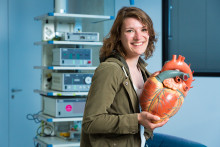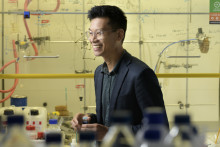Pien Spoor conducted her Master’s graduation project at the Thorax Centrum Twente, a medical center specializing in heart and lungs surgeries, where she optimized a technique which helps to ensure that a patient leaves the operation room with a fully functional bypass.
Measuring the outcome
‘I focus on off-pump coronary artery bypass, which is an operation done on a beating heart without the use of a heart-lung machine,’ explains Spoor. ‘These surgeries can be unsuccessful due to the competitive flow, which occurs if the blood flowing through the coronary artery and the blood going through the bypass start competing with each other. If that happens, the bypass can end up being nonfunctional.’
Because the competitive flow determines the result of the surgery, Pien Spoor started using a technique to measure it. The ‘transit time flow measurement’ shows the flow over bypass, therefore predicting the outcome of the procedure. ‘So far, I have only done the measurements on thirty patients, but we already know that we can certainly measure the competitive flow during the operation,’ says Spoor. ‘Thanks to that, we know what to do and we can immediately make sure that the bypass is 100% functional when the surgery is done.’
Will the bypass work in five years?
‘At the moment, the measurements aren’t able to predict if the bypass will still be working in five or ten years, but that is the next step. We aim to completely prevent the competitive flow and foresee the long-term results of a bypass,’ clarifies Spoor, who has recently defended her Master’s thesis and is continuing her research at the UT and the Thorax Centrum Twente. ‘My project is now scheduled for six months, but I hope to turn it into a PhD project afterwards.’
‘Working partly at a hospital with skilled surgeons and partly at a university with technical specialists is exactly what a technical physician should do,’ thinks Pien Spoor. ‘It’s great that Thorax is open to allowing students of Technical Medicine to be involved in medical procedures as well. I got to assist during the surgeries and it’s wonderful to see how much patients improve, how the quality of their lives increases afterwards – it’s really nice to be a part of that.’







